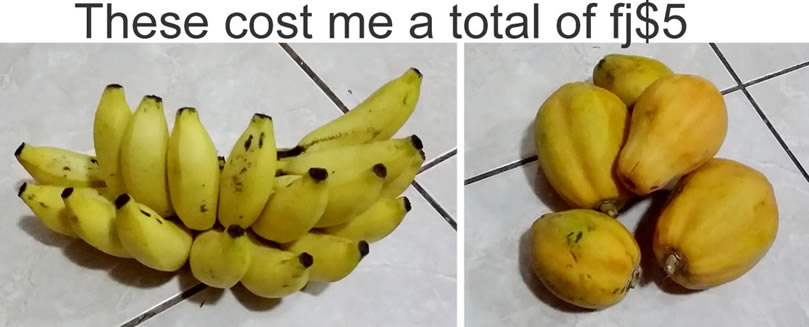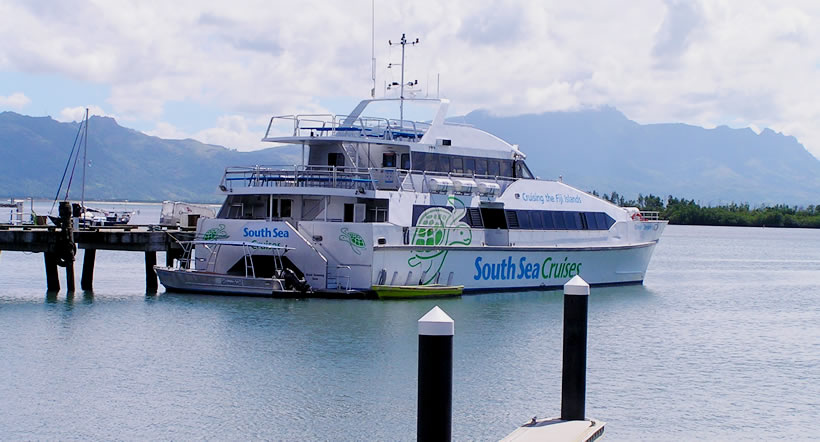Prices In Fiji
Fruit & Vege | Supermarkets | Careful With These | Drinks | Land Transport | Water Transport
Lists last updated Feb 2019
All prices on this page are given in FJ$. All goods are local brands unless stated otherwise.
Fiji is a land of contrasts. Tourists often assume that because unskilled or semi skilled workers earn so little in Fiji ($4 hr or less is common) then everything must be cheap. They think it's going to be like Bali, or Thailand, where you can get by on a few $$ a day.
Sorry to disappoint you, but that's not the case. While it's true that some things are cheap(ish) like local fruits and veges, public transport on bus/shuttle, anything that is geared towards the tourism sector has high prices. Hey, tourists have money, so let's get as much of it off them as we can, right?
An Example Of How Tourists Pay More Than They Should
Nowhere is the exorbitant price gouge more apparent, than water transport.
Example One: We took a bus from Suva to Navoti Landing, 2.5 hr trip. Then the 1hr ferry trip across to Ovalau island, and then the bus again from the dock into Levuka. Total travel time, about 4hrs. Cost for two people, fj$70. Pretty reasonable, and this is the way local people travel.
Compare that to the time we had to catch the S.S.C (South Sea Cruises) boat from Malolo Island to Denarau. a 45min ferry ride. Cost for 2 people, fj$220. Three times the price for a much shorter distance.
Municipal Market Prices

These are the places to shop for fruit and vege if you want good prices and plenty of variety. Food here is very cheap. I developed a taste for pawpaw (papaya) in Fiji, and at $3 for a pile of half a dozen, you can afford to eat as many as you like. Most of the fruit and veges are sold by the pile, not singly.
- Papaya: $3 for 5-6.
- Bananas: $2-3 a bunch.
- Mangos (in season): $3 a pile.
- Watermelon: I forget the price, but it's not actually that cheap and tends to be watery, soft, and rather tasteless.
- Pineapples: $5 a heap. Further east you go, the more expensive.
- Bok Choi: $2 a bunch
- Limes: $2-3 heap. These are the Fijian ones that look like a cross between a lemon, lime and orange. Strange looking, but taste good.
- Mix Vege: 500gm, $3.35
- UHT Milk: $2.75 liter
- Split Peas:
Nadi Supermarket Prices
This is a list of common local produce items purchased at various Nadi supermarkets and convenience stores in 2020. if you shop in tourist areas such as Denarau or anwhere close to a resort, expect the prices to be considerably higher.
- Cigarettes: Pack of 20 B&H, $15-$18
- Tea Bags: 25's, $2.25
- Milk Powder: 450g, $5.95
- Rice, Long Grain: 2kg, $3.34
- Onions: $2.45 per kg
- Tomato Sauce: 425g, $2.18
- Strawberry Jam: 425gm, $4.55
- Mix Vege: 500gm, $3.35
- UHT Milk: $2.75 liter
- Split Peas: $1.83 1kg
Local Brands Versus Imported
As a general rule of thumb, you will pay double the price for imported, compared to local brands. But in many cases you are paying for the name only, the local produce is often just as good. In fact with some things such as the 5min noodles, I actually prefer the local stuff over the brands such as Maggi. And it's the same with biscuits, go local when you can. Not only will you save money, it tastes great.
Items To Avoid
Fiji doesn't seem to have the same health standards as places like Austrailia or NZ. Or if they do, those standards are sometimes ignored. Meat is a good example of things to avoid. After a few bad experiences, we gave up buying so called fresh meat in Fiji. Sometimes the butcher will give you the meat frozen, in which case, be suspicious. When you thaw it out, the whole thing is rotten. And of course they will deny all knowledge if you try to return it (I'm talking from experience).
We also found UHT milk could be a bit hit and miss too. One carton would be fine. The next would just be globs of curds and whey, and the expiry dates have no bearing at all on whether it's bad or not. Total lottery. But when you see crates of produce that should be frozen or chilled sitting outside the shop for hours in the afternoon sun, you understand why.
To be fair, we have never had this problem in Nadi. It has always been in Suva.
Drinks And Beverages
- Coke or Other Fizzy: ?
- Energy Drinks: 500ml Mother*, $4. Red Bull and V is about $4-5 for a 250ml can
- Stubby of Beer: Fiji Gold or Bitter, the lowest I have seen is $5, can be up to $6-8. You will pay over $10 at most resorts
*While the cans of Mother energy drinks look exactly the same as the ones you buy in NZ or Australia, I can tell you they are not the same. I drink far too much of the stuff, enough of it to taste the difference. Not to mention that it made me sick after a while.
Bus, Taxi, Shuttle etc
Taxis: The standard rate is 10c per 100 meters. That is $1.00 per km, or $1.60 per mile. If you know the distance that you are traveling, then you should be able to anticipate the fare in advance.
Express Bus: A busfare from Nadi to Suva (close to 200km distance is a little under $20, and pro-rata amounts for shorter trips.
Local Bus: These are very cheap, nowhere will the fare be more than a few $ although the trip might take longer than you expect.
Shuttles: These tend to charge similar rates as the local buses. As an example, the local bus from Nadi to Lautoka costs $2.76, and a shuttle costs $2.
Carriers: Carriers are usually old Toyota utes with canvas covers over the back and bench seats. Frequently used by locals to get to work and back. You will often find these somewhere close to the Municipal markets.
Water Transport
Water transport is (in my opinion) a total price gouge. Considering that Fiji consists of over 300 islands and many of them are only accessible by boat, people really don't have much choice but to pay the inflated prices. The following is some examples of what you can expect to pay to some of the more popular destinations. Prices are FJ$ and correct when checked Feb 2020.

Denarau To Malolo Island
This is serviced by the S.S.C catamaran, as well as the Malolo Cat. There is also a smaller boat that leaves from Wailoaloa beach, which is cheaper. Prices will vary depending on how far ahead you book, and the time of year.
Mololo Cat, $90 pp one way Denarau to Mololo Island.
S.C.C, $130 pp one way Denarau to Malolo Island. Free Nadi hotel pickups.
Mamanuca Express, This is a premium on demand water taxi service, so expect prices to reflect that.
